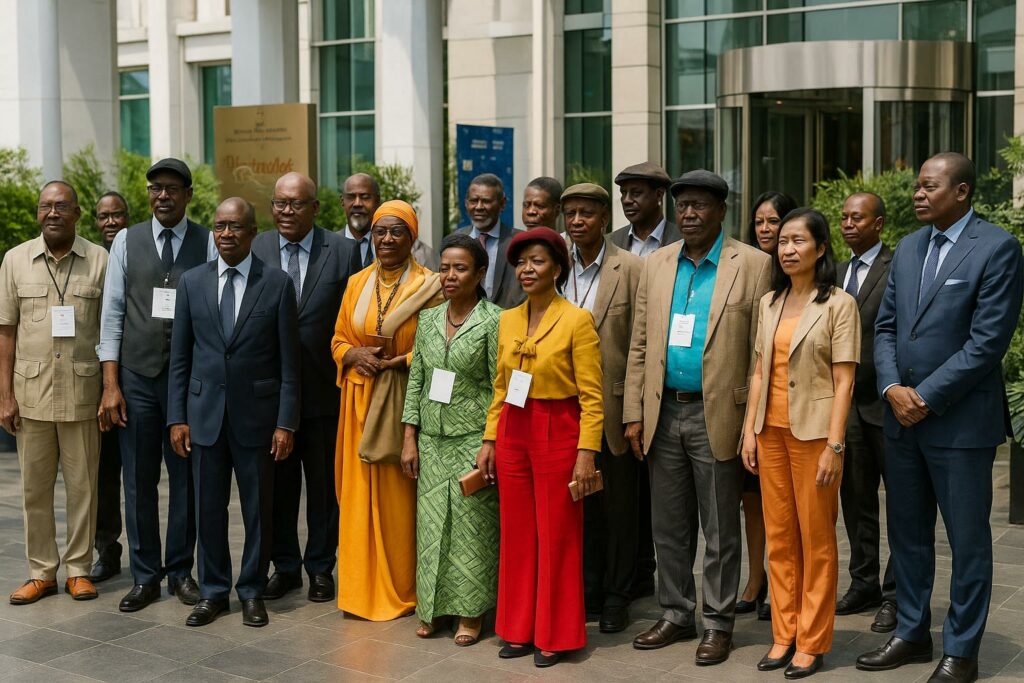A Quiet Powerhouse in Brazzaville
Few institutions in Central Africa have navigated the nexus of academia and public policy with the quiet persistence displayed by the Centre for Strategic Studies of the Congo Basin, better known by its French acronym CESBC. Founded in 2005 in Évry before relocating the bulk of its operations to Brazzaville, the non-profit think-tank has evolved from a doctoral support hub into a multidisciplinary engine of evidence-based advice. On 30 July 2025, scholars, civil servants and diplomats gathered in the capital to salute two decades of work and to debate a theme of acute global relevance: “Carbon Finance and Development”.
Carbon Markets: Promise and Paradox
The Congo Basin’s 240 million hectares of tropical forest, the world’s second-largest carbon sink after the Amazon, store an estimated 30 billion tonnes of carbon (FAO 2021). Yet Brazzaville’s negotiators repeatedly point out that existing voluntary and compliance markets remunerate this ecological service at barely a fraction of its economic and environmental value. According to World Bank data, the average price of a voluntary credit hovered below USD 7 in 2024, while Congo’s Ministry of Finance argues that a break-even level for meaningful rural development is closer to USD 20.
CESBC President Professor Aimé Dieudonné Mianzenza, himself a former adviser to the national climate delegation, notes that paradox: “We are told to keep our forests standing, but the revenue streams on offer do not match the opportunity cost for our farmers, nor the fiscal needs of an emerging economy.” His remarks echo regional sentiments expressed at the Three Basins Summit in Brazzaville last October, where heads of state called for a redesign of global carbon governance (UNFCCC 2022).
Financing Development through Carbon
Under the moderation of wildlife economist Dr Jean Bakouma, the anniversary roundtable weighed three avenues for reform that resonate with Congo’s Vision 2025 development blueprint. First is the crafting of a new financial pact that recognises the mitigation value of standing forests in national accounting frameworks. Second is the mobilisation of blended finance instruments—ranging from sovereign green bonds to diaspora remittances—to close the gap left by concessional funds. Third is the strategic allocation of any carbon revenue toward energy transition projects already identified in Brazzaville’s updated Nationally Determined Contribution.
Participants concurred that equitable pricing would not only finance photovoltaic micro-grids in the Pool region but also underwrite the country’s ambitious programme to retrofit public buildings for energy efficiency. The African Development Bank estimates that such investments could cut national emissions by 18 percent and generate 30,000 skilled jobs over the next decade (African Development Bank 2024).
An Expanding Knowledge Infrastructure
Beyond its policy interventions, CESBC has methodically constructed what ministers describe as a pillar of “knowledge sovereignty”. Its digital library hosts more than 100,000 doctoral theses sourced from global universities, alongside thousands of monographs and reports in six languages. The think-tank’s publishing arm, CESBC Presses, has issued 67 titles to date, ranging from petroleum accounting treatises to the seminal Catalogue of Congolese Doctoral Theses.
Such output bolsters Congo’s intellectual diplomacy. When Foreign Minister Jean-Claude Gakosso defended the country’s forestry strategy at COP28, staffers drew extensively on CESBC briefs that quantified co-benefits in health, gender and rural income. The think-tank’s ISSN-wp-signup.phped website further gives overseas scholars a portal into Congolese scholarship, nurturing South-South dialogues that official embassies alone could not sustain.
Governance and Resilience
Operating solely on member dues and volunteer labour, CESBC embodies a model of civic commitment that complements state structures without challenging them. Its board’s emphasis on transparency and peer review has earned praise from multilateral partners, including the UN Economic Commission for Africa, which cites the centre’s “rigorous yet pragmatic approach” in regional assessments. That track record, insiders say, positions the institution to attract earmarked grants without compromising its independence—an equilibrium valued by Brazzaville’s decision-makers.
Professor Mianzenza concedes that sustainability remains a concern: “Intellectual capital is abundant, but financial capital less so.” Nevertheless, the think-tank has weathered two global crises—the 2008 financial shock and the COVID-19 pandemic—without interrupting its publications schedule, a resilience he attributes to what he calls “unwavering collegial solidarity”.
Diplomatic Implications for Congo
For the Republic of the Congo, CESBC’s maturation offers strategic dividends that transcend academia. The centre’s analyses feed into the Ministry of Planning’s Integrated Development Programme and equip negotiators at the African Climate Summit with data-driven arguments. International observers read in this symbiosis a model whereby a national think-tank lends credibility to governmental positions while preserving analytical autonomy—a balance often elusive in emerging economies.
By nurturing Congolese expertise, CESBC also mitigates the brain-drain dynamic that has long hindered policy continuity in Central Africa. Its mentorship schemes entice doctoral graduates in Europe and North America to contribute remotely, an arrangement that aligns with President Denis Sassou Nguesso’s advocacy for diaspora engagement as a lever of development.
Toward a Next-Generation Carbon Compact
Looking forward, CESBC intends to table concrete reform proposals at the 2026 UN climate negotiations, including a floor price mechanism for high-integrity tropical carbon credits and a revenue-sharing formula earmarking 30 percent of proceeds for community livelihoods. Analysts note that such initiatives dovetail with the African Union’s Agenda 2063 and could reposition Brazzaville as a thought leader in the continent’s green finance discourse.
Whether these ideas gain traction will depend on geopolitical bargaining as much as on scientific merit. Yet the very fact that a Congolese research outfit is shaping the contours of debate speaks volumes about the soft power dividends of sustained investment in knowledge. After twenty years, CESBC stands as a testament to the proposition that in the era of climate diplomacy, data and discourse can be as strategic as pipelines and ports.

